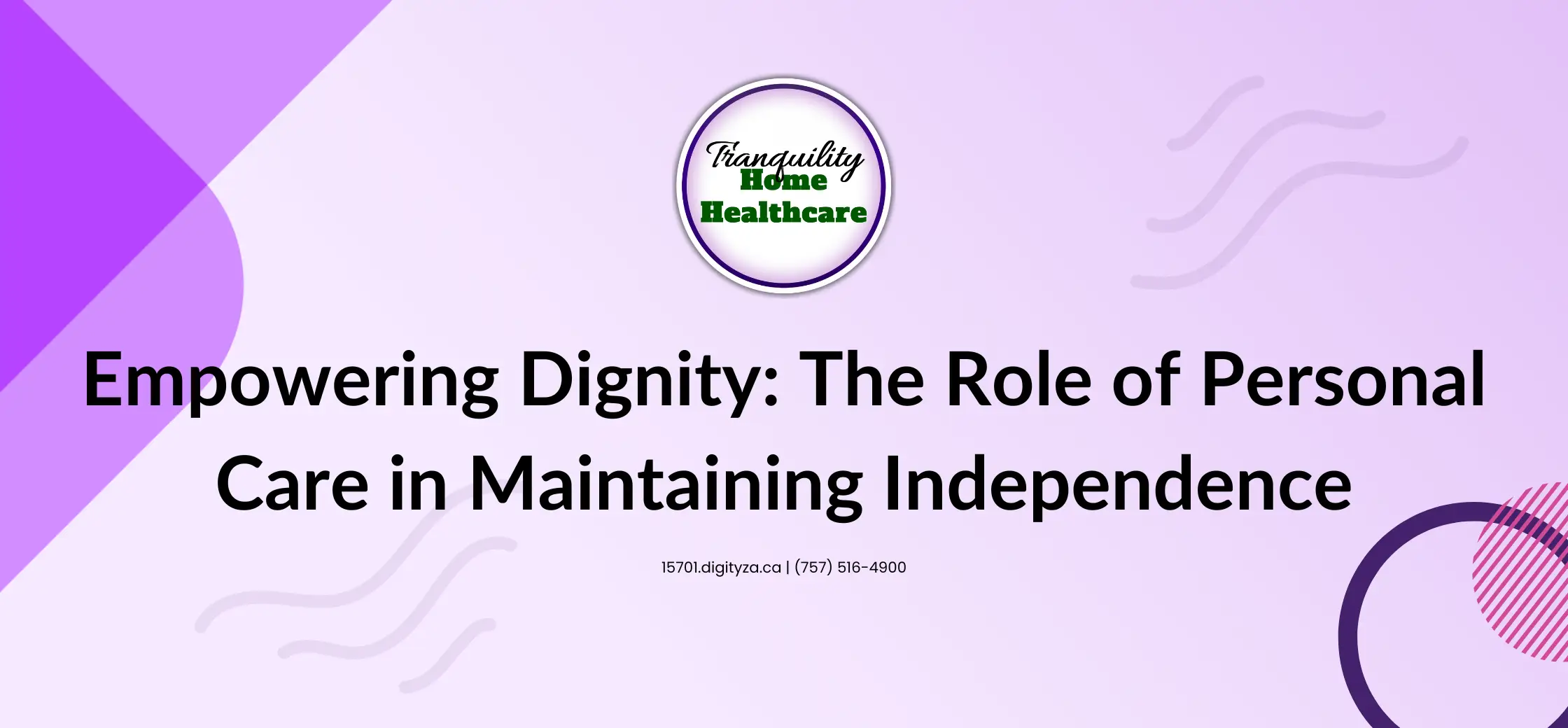Empowering Dignity: The Role of Personal Care in Maintaining Independence
Aging gracefully is about more than just physical health—it’s about preserving dignity, independence, and a sense of purpose. Personal care services play an essential role in helping seniors maintain these values, enabling them to live fulfilling lives in the comfort of their own homes. In this blog, we’ll discuss how personal care empowers seniors, allowing them to remain independent while receiving the support they need.
How Personal Care Supports Independence
Personal care encompasses a wide range of services, from assistance with bathing and grooming to meal preparation and medication reminders. These services are not just about helping with tasks; they’re about fostering an environment where seniors can thrive independently. Personal care helps maintain seniors’ autonomy by enabling them to manage daily activities confidently and comfortably. Learn more about personal care services here.
Empowering Dignity Through Personalized Care
Dignity is an integral part of aging. Personal care services are designed to respect and honor seniors’ preferences and routines, helping them feel valued and respected. Here’s how personal care services empower dignity:
1. Promoting Comfort and Safety at Home
When seniors can receive assistance in their familiar surroundings, they often feel more at ease. Home is where memories are made, and maintaining this comfort is vital for mental well-being. Personal care allows seniors to stay in a place they know, surrounded by familiar sights and routines, which adds a layer of emotional security.
- Why it Matters: Familiar environments boost confidence, reduce stress, and help seniors feel more in control of their lives.
- How it Works: Caregivers ensure safety at home by assisting with mobility, adapting the living space, and providing regular supervision. Discover how in-home care can improve safety.
2. Fostering Independence with Customized Support
Personal care is all about tailoring services to meet the individual’s needs. Whether it’s assisting with daily grooming, dressing, or meal preparation, caregivers focus on supporting seniors’ routines while encouraging participation.
- Why it Matters: Empowerment comes from being able to perform daily activities with minimal assistance. This promotes a sense of achievement and self-reliance.
- How it Works: Caregivers work closely with seniors, providing the right amount of support without taking over, allowing seniors to maintain their skills and confidence.
In-Home Care for Independence: A Balanced Approach
In-home care offers a balanced approach to senior support by focusing on independence. Unlike assisted living, which requires a transition to a new environment, personal care services enable seniors to continue living as they wish while receiving necessary assistance.
1. Maintaining Autonomy
Personal care services encourage seniors to make their own decisions, whether it’s choosing what to wear, what to eat, or when to take a walk. This sense of control is essential for self-esteem and mental well-being.
- Why it Matters: Autonomy supports mental clarity, reduces feelings of helplessness, and enhances overall satisfaction with life.
- How it Works: Caregivers prioritize seniors’ choices, allowing them to guide their care routines and make decisions that matter to them. Explore more about in-home care.
2. Building Trust with Caregivers
Trust is the foundation of any caregiver-senior relationship. Personal care services are designed to be consistent and reliable, helping seniors build trust with their caregivers over time. This relationship not only improves the effectiveness of care but also strengthens seniors’ confidence in managing their daily lives.
- Why it Matters: Trusting relationships lead to better cooperation, making personal care more effective and meaningful.
- How it Works: Caregivers communicate openly, respect seniors’ privacy, and offer compassionate support that is sensitive to individual needs.
Supportive Care for Dignity and Independence
The supportive nature of personal care services ensures that seniors receive the help they need without feeling like their independence is being compromised. Here’s how supportive care contributes to dignity:
1. Encouraging Participation in Daily Activities
Caregivers encourage seniors to actively participate in daily activities, whether it’s cooking a meal, taking a short walk, or engaging in a favorite hobby. This involvement promotes physical and mental well-being.
- Why it Matters: Staying engaged in daily activities enhances cognitive function, reduces feelings of loneliness, and promotes a sense of accomplishment.
- How it Works: Caregivers offer the necessary support to make activities safe and enjoyable, encouraging seniors to maintain an active lifestyle. Learn more about elderly assistance services.
2. Respecting Personal Choices
Respecting seniors’ choices is a cornerstone of dignity-focused care. Personal care services allow seniors to maintain control over their routines, preferences, and lifestyle, whether it’s deciding meal times or selecting leisure activities.
- Why it Matters: Feeling respected and valued fosters a sense of worth, which is essential for mental and emotional well-being.
- How it Works: Caregivers listen to seniors’ needs and preferences, ensuring that their care plan aligns with personal desires and choices.
The Role of Personal Care in Maintaining Independence
Personal care services are not just about assistance; they’re about empowering seniors to live with dignity and independence. By providing personalized support, caregivers enable seniors to thrive in their familiar environment, fostering a sense of control and self-worth.
If you’re considering personal care services for your loved one, contact Tranquility Home Health Care. Our caregivers are committed to enhancing seniors’ dignity and independence, ensuring they age gracefully in the comfort of their own homes.

